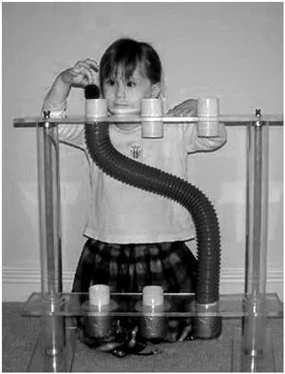Hood, Bruce - Supersense
Здесь есть возможность читать онлайн «Hood, Bruce - Supersense» весь текст электронной книги совершенно бесплатно (целиком полную версию без сокращений). В некоторых случаях можно слушать аудио, скачать через торрент в формате fb2 и присутствует краткое содержание. Год выпуска: 2009, Издательство: Constable Robinson, Жанр: Старинная литература, на английском языке. Описание произведения, (предисловие) а так же отзывы посетителей доступны на портале библиотеки ЛибКат.
- Название:Supersense
- Автор:
- Издательство:Constable Robinson
- Жанр:
- Год:2009
- ISBN:нет данных
- Рейтинг книги:3 / 5. Голосов: 1
-
Избранное:Добавить в избранное
- Отзывы:
-
Ваша оценка:
- 60
- 1
- 2
- 3
- 4
- 5
Supersense: краткое содержание, описание и аннотация
Предлагаем к чтению аннотацию, описание, краткое содержание или предисловие (зависит от того, что написал сам автор книги «Supersense»). Если вы не нашли необходимую информацию о книге — напишите в комментариях, мы постараемся отыскать её.
Supersense — читать онлайн бесплатно полную книгу (весь текст) целиком
Ниже представлен текст книги, разбитый по страницам. Система сохранения места последней прочитанной страницы, позволяет с удобством читать онлайн бесплатно книгу «Supersense», без необходимости каждый раз заново искать на чём Вы остановились. Поставьте закладку, и сможете в любой момент перейти на страницу, на которой закончили чтение.
Интервал:
Закладка:
What would motivate a souvenir hunter to want to own a brick or some physical thing associated with a murderer? The same goes for objects such as Nazi memorabilia. The world’s largest auction website, eBay, has banned the sale of these items and anything that glorifies hatred, violence, or intolerance. But what attracts people to them in the first place? Maybe it’s the excitement of being subversive. Any parent with a rebellious teenager knows that the macabre is a source of fascination for these fledgling adults. Part of growing up is the need to express individuality through statements of rebellion. By their nature, taboo topics intrigue the young who want to be outrageous in an effort to shock.

FIG. 1: The passageway at 25 Cromwell Street where the Wests buried many of their victims. AUTHOR’S COLLECTION.
What about collectors of less insidious memorabilia? Mature adults will pay good money for personal items that once belonged to famous people. Some are just common objects, but collectors covet them because of their connection with celebrities. Why else would someone bid on eBay for a fragment of bed linen that was once slept on by Elvis Presley? Were John Lennon’s handwritten lyrics to ‘Give Peace a Chance’ really worth £420,000 at a Christie’s sale in 2008? 5Why pay £1,000 for a swatch of cloth taken from Princess Diana’s wedding dress? 6The charity website www.clothesoffourback.com, started by Malcolm in the Middle mom Jane Kaczmarek and West Wing actor Bradley Whitford, auctions clothes worn by celebrities for the benefit of children’s charities. Many of these items were worn at award ceremonies such as the Oscars or Emmys. These events take place under the glare of the media spotlight, and even the stars most likely to win must sweat a little in anticipation as that envelope is opened. However, their tainted tuxedoes and grubby gowns are highly desirable to the general public. The charity used to offer a dry-cleaning option to successful auction bidders but eventually dropped the service as no one wanted the clothing washed. Maybe the bidders thought they could get the clothes cleaned more cheaply themselves. This seems unlikely, however, if the money was for charity. Why not clean secondhand clothes? After all, we usually wash our own clothes when they get sweaty. I think the real answer could be that collectors did not necessarily want to wear them. They wanted to own something intimate and personal to their idols and the more connection, the better. It’s a fetish in the original use of the word: a belief that an object has supernatural powers. 7
Memorabilia collectors and those with object fetishism are behaving in a very peculiar way. They are attributing to physical objects invisible properties that make them unique and irreplaceable. This kind of thinking is misguided. For one thing, significant objects can be faked. That brick, that tuxedo or that bed linen may be a forgery. In the Middle Ages, there was a roaring trade in Christian relics to cater to the legions of pilgrims traipsing across Europe from one holy shrine to the next. Relics could be any objects connected intimately with religious celebrities. Bones belonging to saints and martyrs were particularly popular as were any items connected with Jesus. Bits of the cross or shreds of the shroud were easy to fake and trade was brisk. If all the fragments of the crucifixion cross were put back together, there would probably be enough to build an ark. The professional sceptic James Randi recounts how, as a boy growing up in Montreal, he visited the St Joseph’s Oratory shrine where the beatified monk Brother André Bessette once lived. Brother André was known as the miracle-worker of Mount Royal. Pilgrims would flock to the shrine seeking supernatural healing for all manner of ills and could reach in to touch the jar containing the preserved heart of the monk housed behind a metal grill in an ornate cabinet. Randi recalls how his father and godfather were asked one day by the proprietors of St Joseph’s Oratory to cut up a roll of black gabardine fabric purchased from a local store into small squares. These were then sold in the gift shop as pieces of Brother Andre’s actual robes worn on his deathbed. Maybe this early experience had a profound influence on Randi becoming a sceptic. 8
Even if an object is inauthentic, many people treat such items as if they possess some property inherited from the previous owner. A property that defies scientific measure. Some believe such objects harbour an inner reality or essence that makes them unique and irreplaceable. Yes, these houses and objects have a history and yes, they may remind us of events and people, but many believe or more importantly act as if these essences are physical, tangible realities. Something to touch or something to avoid. But, of course, they are not. Sweat and blood may have DNA but not bricks and mortar from a house. Rather there is something else that we sense in these objects. Something supernatural.
SUPERSENSE
This book is about the origins of supernatural beliefs, why they are so common, and why they may be so difficult to get rid of. I believe the answer to each of these questions can be found in human nature and, in particular, the developing mind of the child. I am proposing that humans have a natural, intuitive way of reasoning that leads them to supernatural beliefs. Almost like a common sense, but one that is based on supernatural thinking. So let’s call it our ‘supersense’.
Throughout this book, I hope to convince you that we are naturally inclined towards supernatural beliefs. Many highly educated and intelligent individuals experience a powerful sense that there are patterns, forces, energies, and entities operating in the world that are denied by science because they go beyond the boundaries of natural phenomena we currently understand. More importantly, such experiences are not substantiated by a body of reliable evidence, which is why they are super natural and unscientific. The inclination or sense that they may be real is our supersense.
Why are humans so willing to entertain the possibility of the supernatural? As we will see, most people believe because they think they have experienced supernatural events personally, or they have heard reliable testimony about the supernatural from those they trust. I would argue that we interpret our experiences and other peoples’ reports within a supernatural framework because that framework is one that is intuitively plausible. It resonates with the way we think the world operates with all manner of hidden structures and mechanisms. If this is true, we have to ask where does this supersense come from?
Some argue that the most obvious origins for supernatural beliefs come from the different forms of religion – from traditional organized ideologies to various types of New Age mysticism that appeal to gods, angels, demons, ghosts, or spirits. Each of the world’s established religions extols beliefs about entities that have supernatural powers. Whether it is priests preaching in pulpits or pagans dancing naked in the woods, all religions include some form of supernatural belief. 9But you don’t have to be religious or spiritual to hold a supersense. For the nonreligious, it can be beliefs about paranormal abilities, psychic powers, telepathy, or any phenomena that defy natural laws. Those who do not pray in temples or churches may prefer to tune in to one of the many cable television channels dedicated to paranormal investigation, or call one of the multitude of psychic telephone networks looking for answers. Even beliefs about plain old luck, fate, and destiny are supported by our supersense. Why else would newspapers print horoscopes if their readers did not pay attention to them? Religion, paranormal activity, and wishful thinking are three points on a continuum of supernatural thinking. You may just entertain one or possibly all three different realms of belief, but they all depend on a supersense that they are real.
Читать дальшеИнтервал:
Закладка:
Похожие книги на «Supersense»
Представляем Вашему вниманию похожие книги на «Supersense» списком для выбора. Мы отобрали схожую по названию и смыслу литературу в надежде предоставить читателям больше вариантов отыскать новые, интересные, ещё непрочитанные произведения.
Обсуждение, отзывы о книге «Supersense» и просто собственные мнения читателей. Оставьте ваши комментарии, напишите, что Вы думаете о произведении, его смысле или главных героях. Укажите что конкретно понравилось, а что нет, и почему Вы так считаете.












